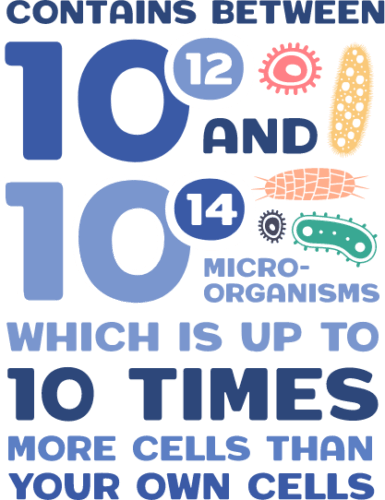Everything you ever wanted to know about microbiota
You hardly spend a day without hearing about microbiota, but you still wonder what it is exactly and what it does for you?
Here you will find all the information you need to understand all this and learn how to take care of your microbiota.
What is microbiota?

Your intestinal microbiota in figures:



These variations can be explained by the fact that the microbiota of an individual evolves over time according to its lifestyle. Before birth, babies’ microbiota is not yet constituted3. The development phase of the intestinal microbiota takes place during the first 3 years of life.
Its diversification depends on several factors such as the type of delivery, breastfeeding, food diversification, etc. After this first phase, the composition of the microbiota stabilizes and remains relatively stable for the rest of its life.
The composition of the intestinal microbiota in adulthood is therefore strongly dependent on the diet and environment that the individual experienced during its early childhood. Certain events can nevertheless modify the composition of the adult microbiota, such as infections, the taking of medication such as antibiotics or a change in diet4.
With age, the microbiota tends to become slightly poorer and less diverse.

What does the gut microbiota do?
Digestion1,2
One of the main functions of the intestinal microbiota is its participation in digestion. On our own, we are not able to digest the insoluble fibers present in our food because we do not have the enzymes necessary to break them down. This is where the bacteria of our intestinal microbiota come to our aid.
They feed on these fibers and digest them by producing compounds called « short-chain fatty acids », nutrients that our cells use in turn as a source of energy and which would have beneficial effects on our health. The microbiota also participates in the proper absorption of certain nutrients and in the synthesis of some metabolites that are essential to the body.Protection1
Immunity1,2
Inflammation2
Why can our microbiota be unbalanced?
Several factors can be at the origin of this state of imbalance:
An unbalanced diet,
too rich in sugars and fats
Infections, especially
digestive infections
Certain medications
such as antibiotics
Stress & anxiety
Genetics
Alcohol and tobacco
consumption
Environmental
polluants
Dysbiosis can manifest itself through:
- Digestive problems, for instance diarrhea or chronic diseases such as the irritable bowel syndrome (IBS) and the inflammatory bowel disease (IBD)6;
- Infections
- Allergies
- Skin disorders
- Mental health disorders (depression, etc)7.
No doubt about it, our microbiota influences our health at all levels!
How to balance your microbiota?
Here are some key tips for taking care of the balance of your gut microbiota:
- Eat more fiber: fiber is the primary food source for your microbiota. It promotes the development of strains of bacteria with anti-inflammatory effects1. For instance, choose whole grains rather than refined grains.
- Diversify your diet: by diversifying your diet, you will help your microbiota to diversify.
- Eat more fermented products: sauerkraut, kefir, kombucha, these foods are rich in probiotics.
- Eat more dairy products: they are also rich in natural probiotics and lactic ferments.
- Take the step of “biotics”: prebiotics, probiotics or postbiotics, many solutions to take care of your microbiota.
- Limit alcohol and tobacco consumption, which are toxic for your microbiota.
- Take care of your sleep.
- Limit sources of stress: a stressed microbiota is a disturbed microbiota.
1. Institut Pasteur, dossier : microbiote, vers une révolution thérapeutique, 2020
2. INSERM, Microbiote intestinal, 2016
3. Selma-Royo, Marta et al. “Shaping Microbiota During the First 1000 Days of Life.” Advances in experimental medicine and biology vol. 1125 (2019): 3-24. doi:10.1007/5584_2018_312
4. Mills, Susan et al. “Precision Nutrition and the Microbiome, Part I: Current State of the Science.” Nutrients vol. 11,4 923. 24 Apr. 2019, doi:10.3390/nu11040923
5. Oxford Languages. Symbiosis, 2020.
6. Pascal V, Pozuelo M, Borruel N, et al. A microbial signature for Crohn’s disease. Gut. 2017;66:813-22.
7. Liang S, Wu X, Hu X, Wang T, Jin F. Recognizing Depression from the Microbiota⁻Gut⁻Brain Axis. Int J Mol Sci. 2018 May 29;19(6):1592. doi: 10.3390/ijms19061592.
PMID: 29843470; PMCID: PMC6032096.